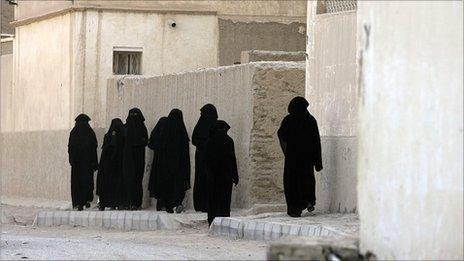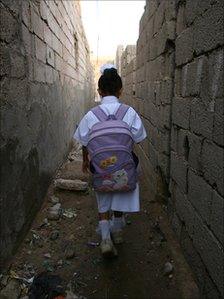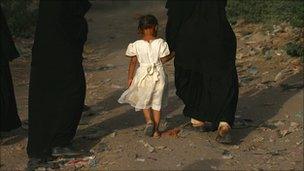Yemeni women: 'All we can do is wait and pray'
- Published

As the political turmoil brews in Yemen, ordinary women are worrying about running their homes and caring for their families. Here, three women tell their stories. All names have been changed to protect their identity.
Umm Ali, a mother-of-five, from Aden
"Since the unrest first started, my daughters have stopped going to school. All the schools near here are now closed because of the teachers' strike.
"Food prices have increased sharply - particularly the price of rice, sugar and wheat. My husband is a day labourer. Since the unrest, he has not found any work. He goes out of the house every morning at five looking for work and then comes back at 10 at night empty-handed. This situation makes him very depressed.
"We eat just two meals a day now - lunch and dinner - and some days we only have enough food for lunch. I borrow money sometimes to buy potatoes so I can cook chips and sell them to try to make a bit of money.
"I have seen that some people are stockpiling food. For us though, there is no way we can save enough money or earn enough money to do this. I can hardly pay off my debts as it is.
"We are afraid of going out of the house for a long time. When I have the money to go out shopping I try to rush, so there is no time to look for the best deal or best goods.
"The price of fuel has also increased. I have only one gas container. It should be enough for the next two weeks, but if the crisis lasts for longer, I will use the firewood I have collected and stored before. I have done this before when I have had no money for fuel.
"I am afraid for the future of my kids. I am praying every day for the end of this crisis. We are living day-by-day because we have no choice. We lack money for food, and for services. In fact, we have nothing. All we can do is wait and pray."
Fatima, a tax officer working in southern Yemen
"Every day, I have to travel two hours by bus from my village to our office in southern Yemen. My salary is 1,600 Yemeni rial each month ($70), but I'm the main breadwinner in the family, and have to support my five siblings and parents.

"[Since the unrest began], my sister has stopped going to university, and all government universities are closed. Transportation has also become difficult and it's hard to get around due to the security situation.
"It's been hard to find cheap transport so I can't go to work every day. Nowadays, I may only go twice a week and that has a bad impact on my income. Moreover, traders have stopped paying their taxes, and that has affected my work as well. I often spend hours at my desk doing nothing.
"The price of food has increased sharply, and my life has become unbearable. I've been looking for an additional job to help provide an extra source of income, but my attempts to find work haven't led anywhere.
"I'm unable to stockpile food as my salary can't cover the extra costs. Instead, I have to reduce the quantity of food we eat. We only eat one type of food all day. If we cook rice, then this should be eaten for lunch and dinner.
"If we bake bread then this is served for breakfast, lunch and dinner. We don't cook anything else. Our water is pumped to us every 10 days and stored in big plastic containers for cooking and washing.
"It's natural to be afraid for the future. The security situation is deteriorating along with our standard of living. Today we have food. Tomorrow we may not."
Hana is the head of a child welfare organisation in southern Yemen which runs a rehabilitation shelter for Yemeni street children
"The movement in the city remains close to paralysed due to military checkpoints, and many bus drivers are very afraid they'll be attacked by protesters, the military, or rebel armed groups. People tend to stay home and only go out to buy food supplies. Some employees have stopped going to their offices and schools are closed.

"Many of our staff, including nannies, have stopped attending the centre due to the security situation. The last demonstration was very close to the centre, and the 60 children who we look after heard shots being fired. Many of the staff are concerned there is nowhere to hide. I don't think the children feel safe at the moment.
"At the centre, we've been storing food since the political crisis began. However, it will only be enough for two months. We can't afford to buy more food due to the paralysis in public services and price increases.
"I'm worried that the centre may be attacked by people who want to steal food. Nowadays, many poor people can't afford to buy food and fuel.
"If the situation gets worse and the centre is no longer safe, we are planning to distribute the children amongst the nannies or leave them with their families or relatives. The future is unclear, and we don't have any emergency plans to overcome this situation."
- Published11 April 2011
- Published21 March 2011
- Published6 April 2011
- Published28 March 2011